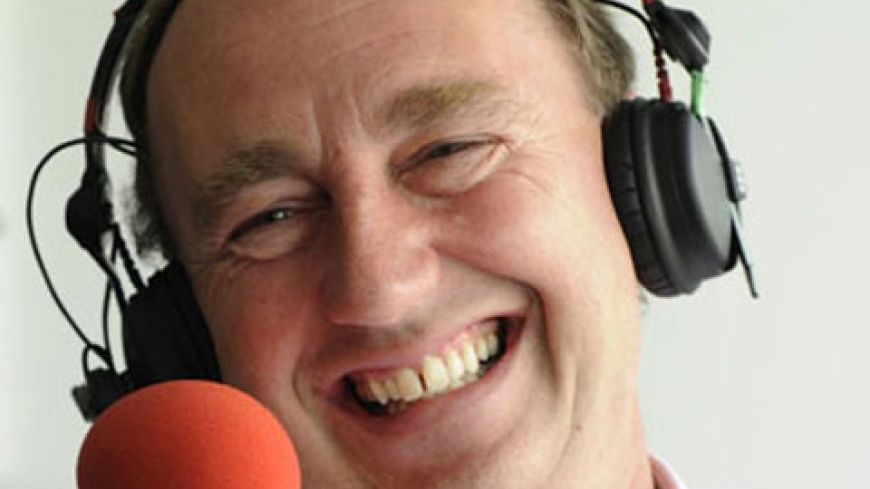
The Edinburgh International Book Festival welcomed Jonathan 'Aggers' Agnew, the well-known presenter of Test Match Special and author of recently published Cricket, A Modern Anthology, and his dog Tino. They were introduced by Ruth Wishart who seemed at first to be an unlikely choice of chair - not being a particular cricket aficionado - but she more than coped with the challenge.
Jonathan Agnew talked about why he enjoyed radio as a medium so much. He felt that radio reached out to people and touches them in more ways than television or indeed the written word. It is, he said, as though the commentator is speaking to each and every individual who is listening.
When he used to hear Brian Johnston commentating, there were always little personalised gems that were introduced to make the presentation that bit more unique. And anyway Agnew thought there was always more 'fun' on radio than on television. He said what a thrill it was for him to see England win the Ashes at 7.45 pm last Monday and he hoped that this excitement would always be there for him.
Asked about the drinking policy in the commentary box, he said that now it is entirely dry and there was a policy of not drinking while the show was on the air. He agreed, however, that Brian Johnston had liked the occasional glass and that John Arlott actually sometimes "liked a bottle"!
Agnew said that after Brian Johnston's death the rules had been changed to no alcohol being drunk in the commentary box - this was not, he stressed, a reflection on previous practice, but it was felt to be more professional.
Ruth Wishart then raised the various scandals that had emerged involving cricketers over the years. Ball tampering, Stewart Broad not 'walking', the various match fixing scandals and she asked 'Aggers' to comment.
He said that the game has always been highly competitive and perhaps is even more so today. He suggested that actually W. G. Grace actually 'stood' and questioned most decisions. Another example he gave was of Michael Holding who tended to 'stand' for everything!
He said he had once tried to get Ricky Ponting and Michael Vaughan together to say which decisions they would accept, so started with examples in front of the wicket and gradually moving to the slips, at which point Ricky Ponting said, "I can see where you are going with this mate!"
Agnew confessed that he was not in favour of technology as there is, certainly at the moment, the feeling that the decision is flawed - he preferred the situation where the umpire's decision was final. In this situation each side generally had a similar deal, some for and some against, so it evened out over the match. He recalled a recent incident where the third umpire even pressed the wrong button, so even technology is fallible and subject to human error.
Wishart asked about Agnew's relations with Geoffrey Boycott. He said that he was brilliant at analysing a batsman, although when playing himself he had all the classic shots, but did not play them as often as he would like. Asked if he preferred Boycott or Botham, Agnew said really he marginally preferred Botham, as Geoffrey Boycott could be somewhat boring over a long period.
As for England captains, who did Agnew think was the best all-round captain? Michael Vaughan, he thought, was the most astute captain, although he enjoyed working with Andrew Strauss who was always very thorough; Graham Gooch was good and Alistair Cook will also be a good captain with more experience.
When questioned by the audience why the interviews with the England team were perhaps 'boring' Agnew agreed and said that the team members are coached and told what to say, so sometimes, he felt, it hardly seemed worth putting on the recording machine! He felt that the management does not like people being controversial and having quotations in newspapers. As for future commentators, he thought that Graeme Swann would end up in the commentary box as he speaks well and has a good understanding of the game.
Asked about the last Test Match where things rapidly turned round from Australia being 120 for 1 wicket, he felt that there must have been something said in the dressing room as the change after tea was remarkable and for Broad to take six Australian wickets for 20 runs was quite exceptional. He was bowling at 97 mph with the wind behind him and it made a brilliant finish for England.
When asked if the future of the Tests was secure, Agnew said that there may have to be a move to the way that women's cricket operates where there is only one test match and then a mix of one day and 20/20 games with points being awarded for each win - he said that he felt this might be a possibility, but only if the present format lost support.
This was again a fascinating hour with a highly articulate and most amusing journalist who was clearly on top form. One can see why many people watch cricket on television but have the radio commentary playing! And 'Aggers' dog, a black spaniel, was impeccably behaved!
Cricket, A Modern Anthology by Jonathan Agnew (Harper Collins, 2013)

